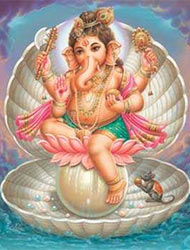Lord Ganesha
 |
GANA in Sanskrit
means 'multitude'and 'ISHA' means Lord. GANESH therefore
literally means 'THE LORD OF ALL BEINGS'. Ganesha
is the first son of Lord Shiva. Shiva represents
the supreme Reality. Ganesha symbolise's one who
has realised the Reality. One who has discovered
the godhood in him. Such a man is said to be the
lord of all beings. Ganesha is known by other names
as well. Ganapati, Gajanana, Vinayaka, Vighneshwara.
Gajanana means 'elephant-faced' Gaja-elephant. Ganesha
has four arms. The four arms represent the four
inner equipment's of the subtle body, namely mind,
intellect, ego and conditioned-consciousness. In
one hand he holds an axe and in another a rope.
The axe symbolise's the destruction of all desires
and attachments and their consequent agitation's
and sorrows. The rope is meant to pull the seeker
out of his worldly entanglements and bind him to
the everlasting and enduring bliss of his own Self
There is a delightful story about a contest between
Lord Ganesha and his brother, Kartikeya. Kartikeya
was very proud of his mount, the peacock, and his
own speed and efficiency. He challenged Lord Ganesha
to a race which would involve encircling the world
three times. Lord Shiva signaled to indicate that
the race had begun. Kartikeya immediatly climbed
atop his peacock and left to circle the whole world.
Ganpati just smiled. He encircled Lord Shiva and
Godess Parvati thrice. When Kartikeya came back
to Mount Kailash, he was very surprised to find
Ganpati there. Ganpati told him that ones parents
are one's own world and encircling them means encircling
the world. He had thus won the race. |
|
Symbolism
Ganapati is a Lord of intellect
and higher knowledge. Each part of Lord Ganesh symbolizes
the intellect. Since Ganeshji represents auspiciousness,
his whole being has symbolic imports for devotees: Large
ears - signify listening to God's katha with great zeal.
Small eyes - to do the Lord's darshan minutely.
Large forehead - to
develop great intellect to realise God.
Large stomach - depicts
his great capacity to empathise with the woes of devotees.
Short legs - depicts
patience.
Long trunk - symbolic
of his deep scriptural wisdom.
Mouse as vehicle - a hyperactive creature,
symbolic of our indriyas. (Therefore Ganesh sitting on
such a vehicle represents a deity of control over the
indriyas).
Four arms - which hold: 'ankush' - symbol
for control over the mind
'ladu' - for happiness
'pash' - axe to punish the indriyas and
antahkaran
'ashirvad mudra' - blessings for the
well being of humanity
Depending on the role of Ganapati,
the number of arms varies, as do the type of objects.
What is the significance
of celebrating Ganesh Chaturthi?
In the 120 days from the full moon
(pournima) in Ashadh till that in Kartik of the Hindu
lunar calendar, yama frequencies, which have the ability
to destroy and are tama predominant reach the earth in
greater quantities. During this period they are of a greater
intensity. However since during the same period, that
is from the fourth day (chaturthi) in the bright fortnight
of Bhadrapad till Anant chaturdashi, Ganesh frequencies
too reach the earth in greater quantities it helps in
reducing the intensity of the yama frequencies. Thus celebrating
Ganesh Chaturthi derives the benefits from Ganesh frequencies
and helps in reducing the effects of yama frequencies.